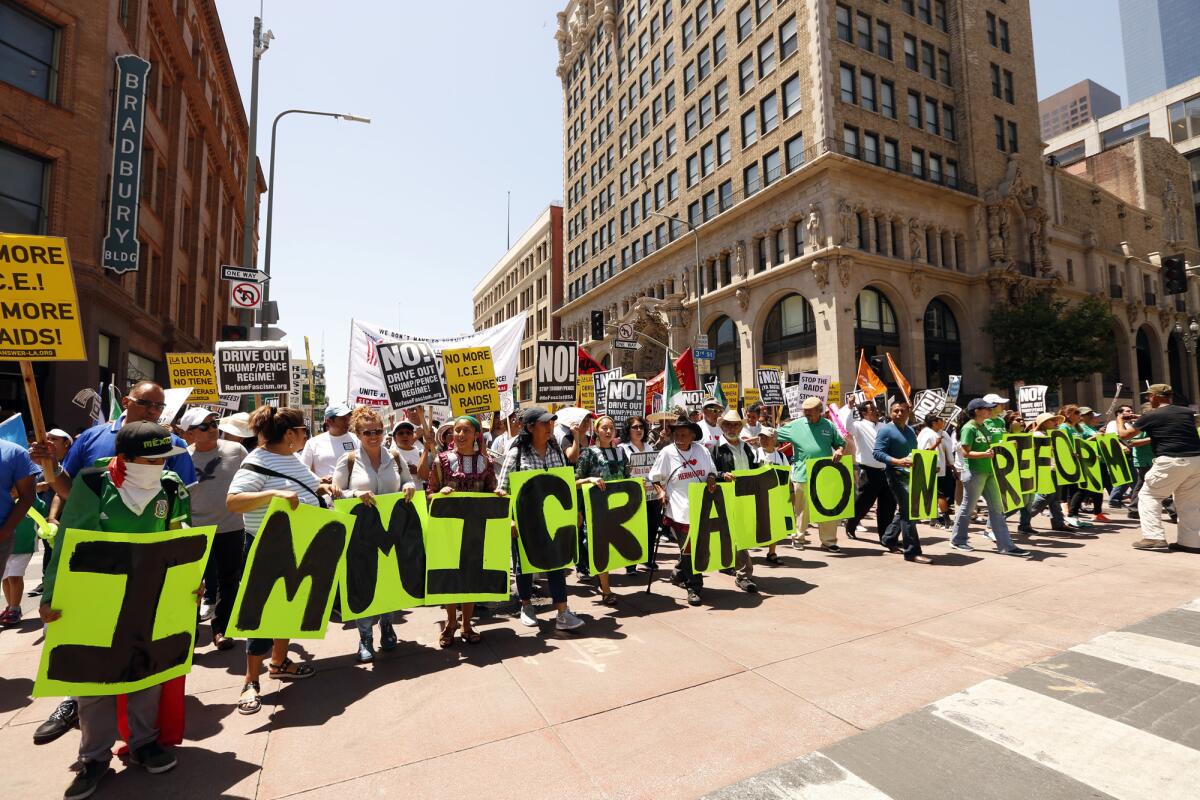Woman posing as an attorney stole immigrants’ cash and dreams, prosecutors say

- Share via
Maria Bejar-Mejia arrived at the Citizenship and Immigration Services office in downtown Los Angeles with high hopes.
She had come to the U.S. illegally years before and her attorney, Jessica Godoy Ramos, told her she would receive a coveted green card at her appointment with immigration officials, authorities said in an account of the meeting. The $2,000 that Bejar-Mejia had paid the lawyer seemed like a small price to pay to cement her legal status in the country.
Ramos accompanied Bejar-Mejia. After the pair had waited an hour, Ramos excused herself to use the restroom. When she didn’t return, Bejar-Mejia called. Ramos said she was meeting privately with an immigration officer.
Prosecutors now say it was all a lie.
Bejar-Mejia checked with an immigration officer: She had no appointment that day, or any day for that matter. There was no record of her ever applying for legal status.
On Thursday, the U.S. attorney’s office in Los Angeles announced criminal charges against Ramos. The 36-year-old from Lynwood is accused of stealing the identity of an actual attorney and conning dozens of immigrants, telling them that for a price she could navigate the country’s complicated immigration bureaucracy on their behalf.
Ramos faces charges of mail fraud and identity theft. According to a court filing by a Homeland Security Investigations agent, she turned herself in to authorities and confessed to operating the scam.
Ramos appeared before a U.S. magistrate judge Thursday afternoon but did not enter a plea. She and her attorney could not be reached for comment. She was set to be released on bail, according to U.S. attorney’s office spokesman Thom Mrozek.
Investigators allege that a search of disorganized files Ramos kept in a storage facility identified about 80 clients. In about half of the cases, Ramos did no work at all and sometimes forged documents to convince people she had resolved their cases, according to court records. In other cases, she filed actual paperwork with immigration officials, but sometimes used the wrong forms and made other mistakes.
Some of the people who hired Ramos were in custody facing deportation, while others wanted to apply to legalize their status in the country or renew their green cards, said Christopher Kuemmerle, supervisor of the Homeland Security Investigations task force that investigated the case.
“This type of scam, which unfortunately targets new immigrants too often, undermines our immigration system and can shatter dreams of obtaining legal status to remain in the United States,” acting U.S. Atty. Sandra R. Brown said in a statement.
The case is the latest to underscore the sub-par legal assistance and outright fraud immigrants often encounter when trying to find someone to assist them with the often complicated processes for amending a person’s immigration status and challenging violations. Although impostors like the one Ramos is alleged to be are nothing new, Kuemmerle said he has seen a recent increase in the number of investigations and reports of such cases his team has received.
Homeland Security Investigations agents first got wind of Ramos in February, on the day she allegedly abandoned Bejar-Mejia. Bejar-Mejia and four other people had been summoned to the U.S. Citizenship and Immigration Services office by Ramos for nonexistant appointments and an official there contacted investigators, according to a 12-page affidavit filed by an HSI agent that detailed the investigation.
Bejar-Mejia told investigators she and her husband first met with Ramos at a Starbucks in July 2014 in Lynwood. Ramos told the couple she was an attorney from New York and explained the unusual location by saying she worked only part time because of an illness.
Months later, before Bejar-Mejia traveled to Mexico, Ramos provided her a temporary immigration document she had counterfeited, according to the affidavit. When forging the document, Ramos mistakenly titled it I-521 instead of its actual title, I-512, investigators found.
Not knowing it was a fake, Bejar-Mejia presented the document to immigration officials when she returned to the U.S. Although suspicious, they eventually allowed her into the country, the affidavit said.
Another client, Vidal Rios, told investigators how he paid Ramos $1,700 to renew his expiring status as a legal permanent resident and apply for citizenship, records show. Over the span of seven months, Ramos told Rios he had several appointments with Citizenship and Immigration Services officials to complete applications only to tell him they were canceled, the affidavit said.
Kuemmerle said immigration officials were still in the process of reviewing the files of each of Ramos’ clients to determine their immigration status and how to address Ramos’ alleged mishandling of cases.
According to the affidavit, Ramos told investigators she attended the Gould School of Law at the University of Southern California but dropped out — a claim USC officials denied. When a lawyer she worked for pressed her for proof she was licensed to practice law, Ramos reportedly scoured the internet until she found another Jessica Ramos who was an attorney in New York. Using the woman’s registration number from the New York Bar Assn., Ramos created a bar card with her photo.
The out-of-state registration and the meeting at Starbucks should have been red flags to people, Kuemmerle said.
“If it doesn’t smell right, it very well might not be right,” he said.
For more news on federal courts in Southern California, follow me on Twitter: @joelrubin
ALSO
100 residents evacuated after deputies find military explosives in a Lawndale backyard
L.A. Unified students toss out $100,000 in food a day. A new state law could donate it to food banks
More to Read
Sign up for Essential California
The most important California stories and recommendations in your inbox every morning.
You may occasionally receive promotional content from the Los Angeles Times.











